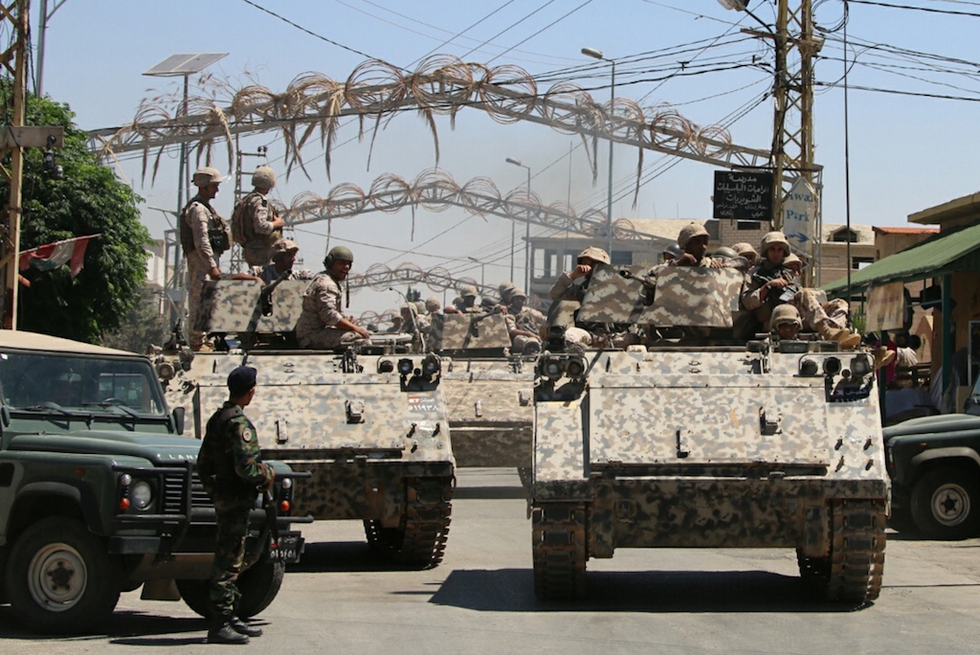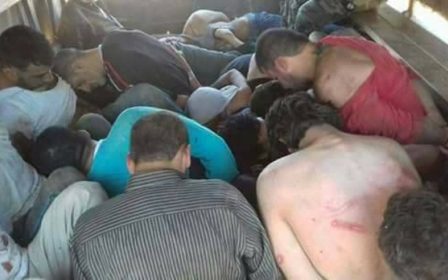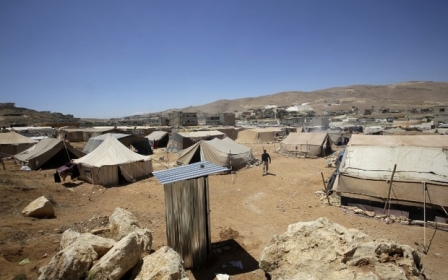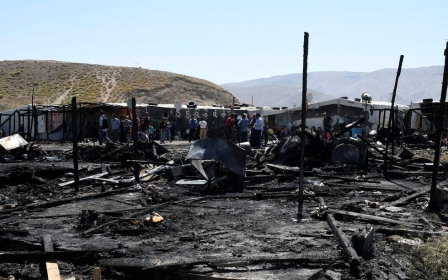Rights groups call for probe on Lebanese army torture claims

Syrian human rights groups have urged the British government to review a recent promise of £20m in aid to the Lebanese army following reports that several Syrian refugees were tortured to death following an army raid.
A number of UK-based Syrian rights groups published a joint letter criticising the UK government for providing material assistance to the Lebanese army after evidence reported by Middle East Eye and others indicated that a number of Syrian refugees who died after a raid on the northern Arsal camp showed signs of torture on their bodies.
The letter, signed by representatives of Syria Solidarity UK, Rethink Rebuild Society and the Syrian Platform for Peace among others, said the allegations of torture "seriously cast doubt on their suitability to be direct recipients of UK aid and military support" and called for an independent investigation into the claims.
"The international community must work to ensure the safety and protection of Syrian refugees in Lebanon. We call on the UK government to urgently raise the issue of the detention, torture, and killing of Syrian refugees with the Lebanese government," it read.
On a visit to Lebanon last year, British Foreign Secretary Philip Hammond announced £15m ($19m) for Lebanese border guard training and £4.5m for the general training of 5,000 Lebanese troops.
"Lebanon is an important part of the front line against terrorism," Hammond said at the time, according to Reuters.
In early July, four Syrian refugees died in custody after they were picked up in mass raids at camps near Arsal on the Syria-Lebanon border.
The four men died after apparently spending several days in the custody of the Lebanese army after the raid, prompting the military to open an inquiry. However, initial forensic reports, seen by MEE, said there was "no evidence of violence" against the prisoners and that the four men had died of natural causes.
But photographs also seen by Middle East Eye show huge gashes and bruising on the bodies of three of the four men, identified as Mustafa Abdel-Kareem Absi, Anas Hussein al-Hsaikeh, Khalid Hussein Moulays, and Othman Merhi Moulays.
The victims were left tied with plastic handcuffs for days on end, "to the point where it caused extreme physical damage - on both their hands and legs," said a legal source who had seen the bodies before their burial on 11 July.
The source told MEE that deep wounds on the corpses were clear indicators of torture.
"There are also the wounds all over their bodies - on the shoulders, arms, knees - especially from the knees. People who were detained and released told me that they were tortured as well."
The source, who cannot be named for security reasons, questioned the army's official version of events, in which the deceased died of heart attacks and a stroke brought on by the weather.
"How can [the army's death report] repeatedly say that there was no violence at all? How can a doctor say that there is no source of violence at all?" the source said. "It was clear there were wounds on the head that led to bleeding."
"This is beyond any doubt. There is clear sign of tension and trauma on the wrists, which could indicate that the victim has been hung by his wrists, by gravity," the source said. A second source with extensive experience of examining images of torture victims said the pictures showed "enough evidence of clear signs of torture".
The Lebanese army has promised to investigate the allegations, although a protest set to take place this week to protest against the mistreatment of refugees was cancelled due to fears of violence.
On Thursday, Human Rights Watch concurred that there had been evidence of torture among the 400 or so refugees picked up by the Lebanese army from Arsal and called on the Lebanese government to take action.
"While the Lebanese army’s promise to investigate these shocking deaths is a positive step, the promise will be meaningless without transparent and independent accountability for anyone found guilty of wrongdoing," said the group’s Middle East director Sarah Leah Whitson.
"Anyone who supports the Lebanese army should support efforts to tackle such serious allegations of military abuse."
Reports of abuse against Syrian refugees in the wider Lebanese society have been frequent since the beginning of the Syrian civil war in 2011, which saw millions of refugees flood into neighbouring Lebanon.
On Wednesday, Lebanese security forces detained on Wednesday a group of men who physically and verbally assaulted a Syrian refugee.
A video showing the attack - widely shared on social media on Tuesday - prompted a public outcry. During the beating, the men are heard shouting expletives at a refugee named Uklah and asking him if he had planned to take part in a protest the following day.
The men demanded of Uklah that he praise the Lebanese army and president and curse the Islamic State and the Syrian people.
Last December, Human Rights Watch (HRW) published the harrowing account of a Syrian refugee who said he was beaten, verbally abused and had a rod pushed up his anus at Rehanieh military police prison on the suspicion of being gay.
HRW has thoroughly documented 10 cases in which civilians in Lebanese military detention said that they were tortured. This included during interrogations, when none of them had access to a lawyer or their families.
The British foreign office said: "Lebanon is on the frontline of the crisis in Syria and faces a high threat from terrorism. Our support for the Lebanese Armed Forces is enabling them to build their capabilities, strengthen the country’s borders and protect the Lebanese people.
"We monitor allegations of human rights abuses closely through our local contacts and encourage the Lebanese Armed Forces to engage with these in an open and transparent way."
New MEE newsletter: Jerusalem Dispatch
Sign up to get the latest insights and analysis on Israel-Palestine, alongside Turkey Unpacked and other MEE newsletters
Middle East Eye delivers independent and unrivalled coverage and analysis of the Middle East, North Africa and beyond. To learn more about republishing this content and the associated fees, please fill out this form. More about MEE can be found here.




